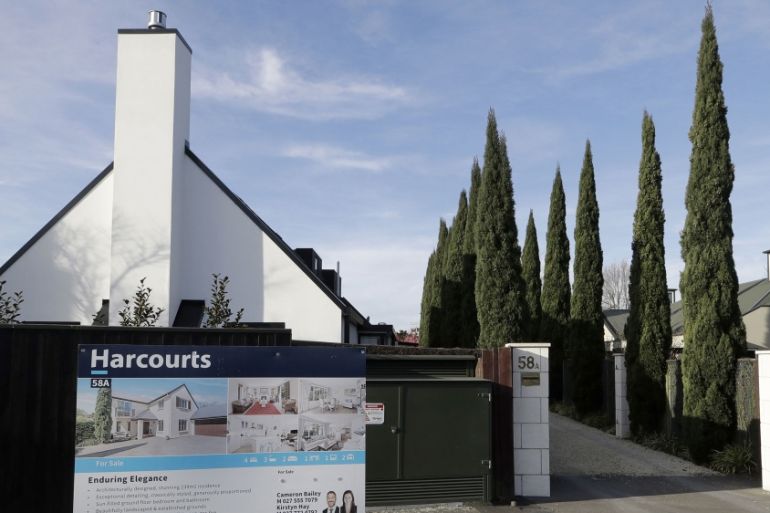New Zealand rolls out ban on foreign national property purchases
New legislation comes amid a housing crisis which has left around one in every 100 New Zealanders homeless.

New Zealand has rolled out legislation banning foreigners from buying existing homes in the country amid an ongoing housing crisis which has left tens of thousands of people homeless.
The Overseas Investment Amendment Bill, passed by parliament on Wednesday, is aimed at making housing more affordable for residents, particularly first-time buyers.
Keep reading
list of 4 itemsKey takeaways from Xi Jinping’s Europe trip
When will EVs become mainstream in the US?
Key takeaways from Xi Jinping’s European tour to France, Serbia and Hungary
“This government believes that New Zealanders should not be outbid by wealthier foreign buyers,” Associate Finance Minister David Parker, of the ruling Labour Party, said in a statement.
“Whether it’s a beautiful lakeside or ocean-front estate, or a modest suburban house, this law ensures that the market for our homes is set in New Zealand, not on the international market,” he added.
Foreigners who already own homes in the country will not be affected by the legislation, which also exempts Australian and Singapore nationals because of bilateral free-trade agreements.
International buyers will still be permitted to buy new properties and land to be used for house-building projects.
About three percent of houses bought in the first three months of this year were purchased by foreign nationals, according to government statistics, with Chinese, Australian and UK citizens accounting for the largest contingent of international buyers.
In Auckland, the country’s most populous city, foreign buyers accounted for almost six percent of all house purchases made during the same period.
‘A nonsense’
In the lead-up to the September 2017 elections, Prime Minister Jacinda Ardern’s election campaign included a pledge to “ban foreign speculators from buying existing homes” and “create a level playing field for first-home buyers”.
But Wednesday’s bill drew the ire of opposition National Party politician Judith Collins, who described it as a cynical attempt to “blame foreigners” for the country’s housing issues.
“This bill in many ways is like using a hammer to try and crush a teeny weeny little nut because it is about saying that every house, every residential house, is now apparently sensitive land. It’s a nonsense,” she said.
The Real Estate Institute of New Zealand’s (REINZ) chief executive also denounced Wednesday’s law change.
“We don’t believe that banning foreign buyers from purchasing property in New Zealand is going to have any impact on house prices, nor will it help young people into their first homes,” Bindi Norwell said.
#REINZCEO @bindinorwell said, "We don't believe that banning foreign buyers from purchasing property in New Zealand is going to have any impact on house prices, nor will it help young people into their first homes." https://t.co/0GTs0sm9H5
— REINZ (@REINZTweets) August 15, 2018
House prices have jumped by more than 60 percent in the past 10 years, according to the Reserve Bank of New Zealand.
Meanwhile, home ownership levels dropped last year to 63.2 percent nationwide, the lowest level since 1951, according to local media.
The median price for residential property throughout the country was 550,000 New Zealand dollars (US$365,000) in July, according to REINZ, more than 11 times the average level of annual personal income in 2017.
About one in every 100 New Zealanders, or 41,000, were homeless or living in emergency housing or substandard shelters in 2013, according to the country’s most recently published census data.
The country has the highest rate of homelessness among member states of the Organisation for Economic Cooperation and Development (OECD), a study by Yale University revealed last year.
The study also noted, however, that definitions of homelessness vary by country.